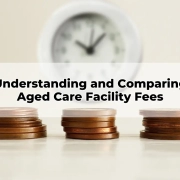Gifting and Age Pension: What You Need to Know
Table of Contents
ToggleThe Age Pension in Australia serves as a crucial financial support for many seniors. It provides a regular income to those who meet specific eligibility criteria, ensuring they can maintain a basic standard of living in their later years.
As life expectancy increases, planning for aged care becomes more important. Proper financial planning helps ensure that individuals can afford the care they need without undue financial stress. Please get in touch if you would like assistance.
This blog post aims to clarify the relationship between gifting and the Age Pension, outlining the rules, implications, and strategies to optimise financial outcomes for aged care.
Gifting and its Definition
What Constitutes a Gift?
A gift, in financial terms, is any asset or money given away without receiving something of equal value in return. This can include cash, property, or even the forgiveness of a debt.
Common Reasons for Gifting
People often gift for various reasons, such as helping family members, estate planning, or reducing assets to qualify for the Age Pension or reduce means tested care fees. Understanding these motivations is key to making informed decisions.
Legal Aspects of Gifting
Gifting is legal, but it comes with certain obligations and rules, especially when it affects pension entitlements. It is essential to be aware of these regulations to avoid unintended consequences.
Age Pension Overview
Eligibility Criteria
To qualify for the Age Pension, individuals must meet age, residency, and means test requirements. The means test assesses both income and assets to determine eligibility and pension rates.
Means Testing: Income and Assets
Means testing is a critical component of the Age Pension eligibility process. It ensures that the pension is distributed to those who need it most by evaluating an individual’s income and assets.
Pension Rates and Benefits
The Age Pension provides various benefits, including a base rate, supplements, and concessions. These benefits help seniors cover living expenses and maintain their quality of life.
The Relationship Between Gifting and Age Pension
Impact of Gifting on Pension Eligibility
Gifting can directly affect pension eligibility. Centrelink, the government body responsible for pensions, scrutinises gifts to ensure they are within allowable limits.
Centrelink’s Gifting Rules
Centrelink has specific rules about how much can be gifted without affecting the pension. Understanding these rules is crucial for anyone considering gifting as part of their financial strategy.
The Five-Year Rule
Gifts made within five years before applying for the Age Pension are subject to Centrelink’s gifting rules. This period is known as the “deprivation period,” and gifts made during this time can impact pension entitlements.
Deprivation Rules
Understanding Deprivation
Deprivation occurs when assets are given away or sold for less than their market value to qualify for the Age Pension. Centrelink treats such actions as if the assets are still owned, impacting pension calculations.
How Deprivation Affects Pension
If Centrelink deems a gift as deprivation, the value of the gift is counted as an asset for up to five years, potentially reducing or eliminating pension benefits.
Strategies to Avoid Deprivation Issues
Careful planning and adherence to Centrelink’s rules can help avoid deprivation issues. Consulting with a financial adviser can provide strategies tailored to individual circumstances.
Gifting Limits and Allowances
Annual Gifting Limits
Individuals can gift up to a certain amount annually without affecting their Age Pension. Currently, this limit is $10,000 per financial year, but it’s important to stay updated on any changes.
Lifetime Gifting Allowances
Over a five-year period, the total amount that can be gifted without penalty is $30,000. Exceeding these limits can trigger Centrelink’s deprivation rules.
Excess Gifting Penalties
Gifting above the allowable limits results in the excess amount being considered as a deprived asset, impacting pension eligibility and entitlements for up to five years.
Special Considerations for Large Gifts
Financial Impact of Large Gifts
Large gifts can significantly impact financial security and pension entitlements. It’s vital to assess the long-term implications before making substantial gifts.
Centrelink’s Treatment of Large Gifts
Centrelink scrutinises large gifts to ensure compliance with gifting rules. Such gifts can be seen as attempts to reduce assets artificially, leading to penalties.
Alternatives to Large Gifting
Instead of large gifts, consider other financial strategies such as investing in exempt assets or spending on necessary expenses that do not impact pension entitlements.
Gifting to Family Members
Benefits and Risks
Gifting to family members can strengthen relationships and provide support, but it carries financial risks, including potential pension implications and family disputes.
Impact on Family Dynamics
Financial gifts can affect family dynamics, sometimes causing jealousy or dependency. Clear communication and legal agreements can help mitigate these issues.
Legal Considerations
Legal considerations include documenting the gift, understanding tax implications, and ensuring compliance with Centrelink’s rules to avoid future complications.
Gifting and Estate Planning
Role of Gifting in Estate Planning
Gifting can be a strategic part of estate planning, helping to reduce the value of the estate for tax purposes and ensuring assets are distributed according to the individual’s wishes.
Balancing Gifting with Other Financial Goals
It’s important to balance gifting with other financial goals, ensuring sufficient resources for aged care and other needs while still providing for beneficiaries.
Protecting the Estate from Future Claims
Properly structured gifts can help protect the estate from future claims, ensuring that assets go to the intended recipients without legal challenges.
Professional Financial Advice
Importance of Seeking Advice
Professional financial advice is crucial for navigating the complexities of gifting and its impact on the Age Pension. Advisers can provide tailored strategies to optimise financial outcomes.
Choosing the Right Financial Adviser
Selecting the right adviser involves evaluating their experience, qualifications, and understanding of aged care financial planning. Recommendations and reviews can also guide this choice.
Key Questions to Ask
Key questions to ask a financial adviser include their approach to gifting, strategies for minimising pension impacts, and their fee structure. Transparency is key to a successful advisory relationship.
Real-Life Implications
Examples of Gifting Gone Wrong
Misunderstanding gifting rules can lead to significant financial and emotional stress. Examples include pension reductions, legal disputes, and strained family relationships.
Success Stories
Conversely, well-planned gifting strategies can enhance financial security and family harmony. Success stories often involve clear communication, professional advice, and adherence to regulations.
Lessons Learned
Lessons learned from others’ experiences highlight the importance of careful planning, legal compliance, and professional advice in successful gifting strategies.
Conclusion
Gifting and its impact on the Age Pension involve complex rules and significant financial implications. Understanding these rules is essential for effective financial planning.
Gifting can be a valuable financial strategy, but it requires careful consideration of Centrelink’s rules and potential impacts on pension entitlements.
Proactive planning, professional advice, and clear communication with family members can help ensure that gifting supports overall financial goals and enhances aged care funding.









